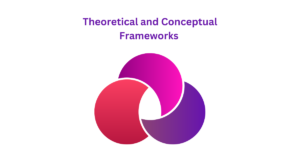
Theoretical and conceptual frameworks are challenging for many reasons. Indeed, Bloomberg (2023, p.23) describes them as “…one of the most misunderstood pieces in the dissertation puzzle and … a source of anxiety and frustration for many”.
Undoubtedly, it takes careful thought and effort to arrive at such a framework while reviewing the research literature relevant to your topic. And it takes time to savour and digest what you have read to gain the necessary perspective.
Ultimately, you need to arrive at a framework or structure that will guide your research from the first chapter of your document to the last. This can be a theoretical framework based on a relevant theory. Or it can be a conceptual framework of related concepts that you purposefully select from theories and/or past empirical research and then cobble together as a structure to explain your research phenomenon. Of course, you may need to develop your framework further as your understanding of the theoretical literature deepens.
But that’s not where it ends. As your framework is the guiding structure of your research, it needs to be the guardian of every chapter of your document.
In the Introduction chapter, your framework needs a presence – as a potential solution to your research problem or as a diagnosis of the problem, it needs to be introduced to your reader at a high level. By the end of the Literature Review chapter, it must be made explicit, detailed, and justified so your reader understands how it will be used to explain your research phenomenon. In your Methodology chapter, it needs to structure your research questions and the way your research will answer them. In your Results or Findings chapter, the framework needs to structure the presentation of your results or findings logically. And in your final Discussion or Interpretation chapter(s), it will form the structure of the outcome of your research process, clearly linking your results to your research questions, thereby addressing the purpose of your research and filling the knowledge gap you identified at the outset.
In my webinar on Thursday night (1 June) at 6:30, I’ll be discussing these critical research frameworks. Hope to see you there.